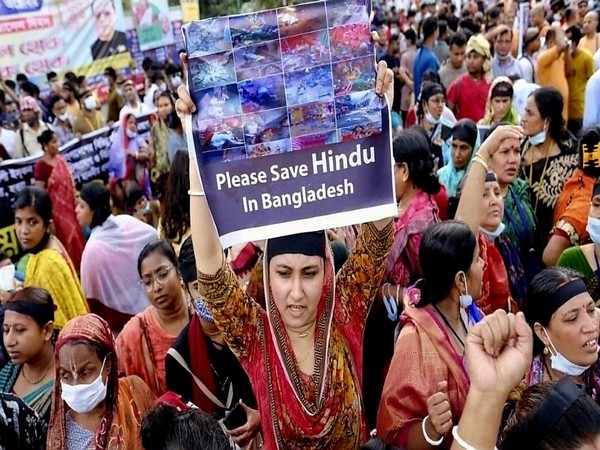Muslim Rashtriya Manch Urges Action Amid Rising Violence Against Minorities in Bangladesh
The Muslim Rashtriya Manch has raised alarms over increasing attacks on Hindus and other minorities in Bangladesh, attributing the violence to Islamic fundamentalists. The MRM emphasizes the urgent need for decisive action to safeguard the affected communities and warns of regional instability if the issue is not addressed swiftly.

- Country:
- India
The Muslim Rashtriya Manch (MRM) has voiced grave concerns over the rising attacks on Hindus, Buddhists, and other minority communities in Bangladesh, asserting that these assaults form part of a deliberate conspiracy by Islamic fundamentalists. MRM national convenor Shahid Sayeed claimed that the objective is to decimate the Hindu population and seize their properties under the guise of reservation. According to Sayeed, the lives, properties, and dignity of approximately 13 million Hindus in Bangladesh are in jeopardy.
Sayeed highlighted the historical context, noting that at the time of Bangladesh's independence, Hindus made up 29 percent of the population, a figure that has now drastically reduced to less than 9 percent. He warned that Bangladesh risks following a path similar to Pakistan's unless stringent measures are taken to curb these attacks and safeguard the minority communities.
Emphasizing the unmitigated violence, Sayeed said the ongoing anti-reservation movement seems to be a facade, as attacks on Hindus persist unabated. Homes, shops, and temples of Hindus are systematically targeted, suggesting a coordinated campaign against the community. He particularly pointed to the new interim government, where Nobel laureate Mohammad Yunus holds a crucial role, urging them to take strong action to ensure the safety of Hindus and bring stability to the region.
At an emergency meeting in New Delhi, National Convenor Mohammad Afzal underlined the importance of the Citizenship Amendment Act (CAA), suggesting it would have equipped the Indian government with a better mechanism to address crises like the one in Bangladesh. Afzal criticized opposition to the CAA, labeling it as unconstitutional and unjust, and accused them of endangering vulnerable communities' safety.
Professor Shahid Akhtar, another National Convenor, pointed to a deep-seated conspiracy behind the anti-reservation movement, involving fundamentalists from Pakistan, China, and Bangladesh aiming to subjugate Hindus. Akhtar lauded former Prime Minister Sheikh Hasina's attempts to foster India-Bangladesh relations and curb extremism, bemoaning the swift decline in conditions following her exit from power.
National Convenor Syed Raza Hussain Rizvi condemned the continued violence in Bangladesh, asserting that Islam is a religion of peace and such actions misrepresent its true nature. Rizvi denounced the attacks, murders, and rapes, stressing that they unjustly malign Islam's image and reiterated that the MRM will not tolerate violence perpetrated in its name.
MRM National Convenor Abu Bakar Naqvi echoed these concerns, highlighting the forced displacement of Hindus and the occupation of their homes and lands. Naqvi criticized the Bangladesh government for failing to prevent these atrocities and urged India to adopt a strategic diplomatic approach to help restore peace in Bangladesh.
MRM National Convenor Dr. Shalini Ali stressed the need for robust diplomatic and administrative measures to address the deteriorating situation and bring perpetrators to justice, noting that the Indian government is in constant contact with Bangladeshi officials.
Attendees of the emergency meeting included MRM leaders such as Mohammad Afzal, Professor Shahid Akhtar, Abu Bakar Naqvi, S.K. Muddin, Syed Raza Hussain Rizvi, Girish Juyal, Virag Pachpor, Dr. Tahir Hussain, Islam Abbas, Mohammad Irfan Ahmed Pirzada, Mazahir Khan, Reshma Hussain, Dr. Shalini Ali, Mohammad Ilyas, Shahid Sayeed, and Dr. Rajiv Srivastava.
(With inputs from agencies.)










